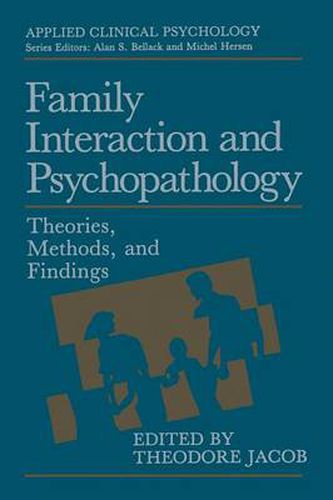Readings Newsletter
Become a Readings Member to make your shopping experience even easier.
Sign in or sign up for free!
You’re not far away from qualifying for FREE standard shipping within Australia
You’ve qualified for FREE standard shipping within Australia
The cart is loading…






This title is printed to order. This book may have been self-published. If so, we cannot guarantee the quality of the content. In the main most books will have gone through the editing process however some may not. We therefore suggest that you be aware of this before ordering this book. If in doubt check either the author or publisher’s details as we are unable to accept any returns unless they are faulty. Please contact us if you have any questions.
Throughout the past 30 years, there have been significant developments in theory and research relating family variables to various psychopathologies. The potential importance of such efforts is obviously great, given the implications that reliable and valid findings would hold for treatment and preventive inter ventions across a variety of settings and populations. The purpose of this volume is to present a critical evaluation of this field of inquiry through a detailed assessment of the theoretical perspectives, the methodological issues, and the substantive findings that have characterized family studies of psychopathology during the past several decades. The book is divided into four parts, each con taining contributions from leading researchers and theorists in the field. The first part, Background, presents a review of the major streams of influence that have shaped the development and the present character of the field. The second part, Conceptual Foundations, contains presentations of gen eral models and orientations relevant to family studies of psychopathology. In most cases, a particular theoretical perspective provides the primary underpin ning of the approach, the exception to this format being the family model of David Reiss based on the concept of the family paradigm. The major objective of this part is to present a broad yet detailed set of chapters that address the conceptual status of the field. It is hoped that this material will provide a rich background against which subsequent discussions of specific theories, methods, and findings can be more fully appreciated.
$9.00 standard shipping within Australia
FREE standard shipping within Australia for orders over $100.00
Express & International shipping calculated at checkout
This title is printed to order. This book may have been self-published. If so, we cannot guarantee the quality of the content. In the main most books will have gone through the editing process however some may not. We therefore suggest that you be aware of this before ordering this book. If in doubt check either the author or publisher’s details as we are unable to accept any returns unless they are faulty. Please contact us if you have any questions.
Throughout the past 30 years, there have been significant developments in theory and research relating family variables to various psychopathologies. The potential importance of such efforts is obviously great, given the implications that reliable and valid findings would hold for treatment and preventive inter ventions across a variety of settings and populations. The purpose of this volume is to present a critical evaluation of this field of inquiry through a detailed assessment of the theoretical perspectives, the methodological issues, and the substantive findings that have characterized family studies of psychopathology during the past several decades. The book is divided into four parts, each con taining contributions from leading researchers and theorists in the field. The first part, Background, presents a review of the major streams of influence that have shaped the development and the present character of the field. The second part, Conceptual Foundations, contains presentations of gen eral models and orientations relevant to family studies of psychopathology. In most cases, a particular theoretical perspective provides the primary underpin ning of the approach, the exception to this format being the family model of David Reiss based on the concept of the family paradigm. The major objective of this part is to present a broad yet detailed set of chapters that address the conceptual status of the field. It is hoped that this material will provide a rich background against which subsequent discussions of specific theories, methods, and findings can be more fully appreciated.